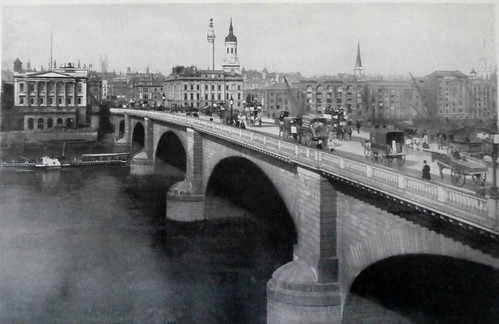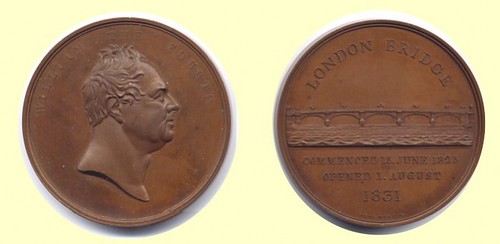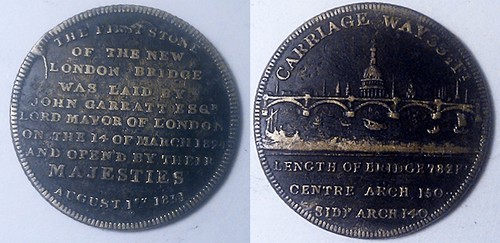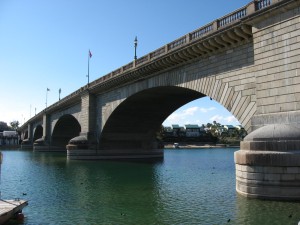
PREV ARTICLE
NEXT ARTICLE
FULL ISSUE
PREV FULL ISSUE
MEDALLIC REMEMBRANCES OF LONDON BRIDGE
This week I'm on vacation ('holiday', for our British friends), and along our drive my family broke out singing "London
Bridge Is Falling Down." More on that later. First, here's an excerpt from Greg Ruby's Sherlock Holmes Fourth
Garrideb blog about medals depicting the London Bridge. -Editor

London Bridge circa 1890 London Bridge is mentioned in The Adventure of The Greek Interpreter as Holmes and Watson rush to rescue Mr. Melas from his abductors. London Bridge and the nearby London Bridge Station are also referenced in the following stories from the Canon: The Man With The Twisted Lip, The Adventure Of The Norwood Builder, The Adventure Of The Bruce Partington Plans, and The Adventure Of The Retired Colourman. In this post, we will take a look at a few medals and tokens that feature the London Bridge that existed for the stories in the Canon. Construction of the “new” London Bridge began in 1824 to replace the 600 year old London Bridge that desperately needed to be replaced. The foundation stone was laid on June 15, 1829 and the bridge was completed and opened for use on August 1, 1831. The bridge would continue in use until a replacement bridge was built around the now “old’ bridge starting in 1967. The “old” bridge was disassembled carefully and the stones recorded to be sold to an American entrepreneur. After the “old” bridge had been removed, the two replacement bridges had a central span build to connect the two bridges into one “new” London Bridge. 
Prior to the opening of the bridge on August 1, 1831 a huge banquet was held in a tent on the bridge to celebrate. King William IV and Queen Adelaide attended the festivities. This 51mm bronze medal was engraved by Benjamin Wyon, who earlier in 1831, became Chief Engraver of the Seals by appointment of the King. 
This 28mm base metal token also commemorates the opening of the bridge. This token states that the first stone of the bridge was laid March 14, 1824 and not the date of June 15, 1824, which is the generally accepted date. 
The dismantled “old” London Bridge would be packed up and sent through the Panama Canal on a journey that would take it to Lake Havasu City, Arizona. The reassembled bridge would be rededicated on October 15, 1971.
In the couple weeks leading up to our vacation, our son Tyler worked hard mowing lawns and babysitting for neighbors, saving up his money
for a long-desired purchase - a $200 Lego set of the Tower Bridge in London. It arrived a couple days before our departure, and he spent
hours on end assembling the 2,000-some pieces. He managed to complete it the night before we left.
Excited to show everyone his handiwork, he began carrying it upstairs on a small table from the basement family room. He hit a bump and watched in horror as the entire bridge slid off the table and crashed to the floor, shattering it worse than a German Blitzkreig ever could. We heard his bloodcurdling scream and ran to see what happened. He scared the crap out of us. He was inconsolable, but did eventually calm down and could (almost) laugh about it. We tried not to, but it was hard. At least no one was hurt, and he'd have a chance to build it all over again a second time. So when he started singing "London Bridge" as we rolled down the highway, I knew he was coming to terms with the incident. And planning to bubble wrap and duct tape it next time. -Editor To read the complete article, see:

Wayne Homren, Editor The Numismatic Bibliomania Society is a non-profit organization promoting numismatic literature. See our web site at coinbooks.org. To submit items for publication in The E-Sylum, write to the Editor at this address: whomren@gmail.com To subscribe go to: https://my.binhost.com/lists/listinfo/esylum All Rights Reserved. NBS Home Page Contact the NBS webmaster 
|